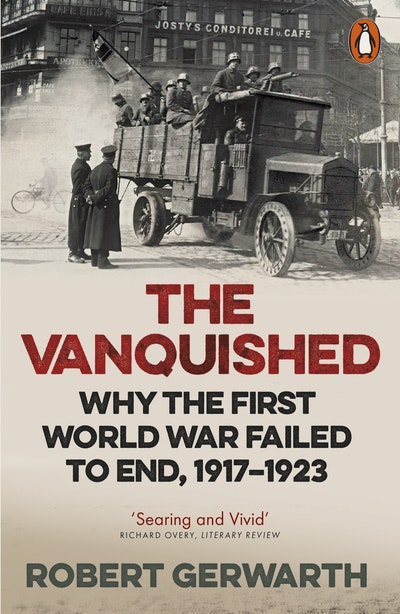- Published: 18 September 2017
- ISBN: 9780141976372
- Imprint: Penguin Press
- Format: Paperback
- Pages: 464
- RRP: $26.99
The Vanquished
Why the First World War Failed to End, 1917-1923
- Published: 18 September 2017
- ISBN: 9780141976372
- Imprint: Penguin Press
- Format: Paperback
- Pages: 464
- RRP: $26.99
This narrative of continent-wide chaos makes it easier to understand why order came to seem a supremely desirable objective in 1930s Europe, trumping freedom ... it helps us understand why few wars reach tidy conclusions: once a society has suspended its instinctive, social and legal prejudice against killing, it often proves hard to restore.
Max Hastings, The Sunday Times
Pulls together a complex narrative about the uneasy peace of the late Twenties and shine a piercing light into darkened corners of history ... an unnerving reminder of how stubbornly some geopolitical fault-lines endure
Sinclair McKay, The Telegraph
A mixture of fast-paced narrative and fluent analysis ... Gerwarth demonstrates with an impressive concentration of detail that in central, eastern and south-eastern Europe the carnage of the first world war by no means came to an end, as it did for the British and French, in late 1918.
Tony Barber, Financial Times
Combining a big-picture overview with close-up detail - we hear the voices of soldiers, politicians, civilians - Gerwarth has written a vivid if disturbing account
Matthew Price, National
Searing and vivid ... a timely reminder that the roots of century-long violence can be traced back to the cataclysmic end of the Great War
Richard Overy, Literary Review
A thorough explanation for the rise of the nationalist and fascist groups who set the stage for World War II.
Kirkus Reviews
Gerwarth's fascinating and finely crafted book is a rich combination of military, political, cultural and social history. He makes good use of literary sources and witness testimony to bring the events he narrates to life ... an impressive work of highly accessible scholarship
Geoffrey Roberts, Irish Times
This is an important and compelling book with a fascinating and chilling narrative ... Gerwarth reveals how the forgotten postwar violence comprised a key step on Europe's descent into darkness.
Alexander Watson, BBC History Magazine
While Gerwarth's warfare theories are cogent and convincing, he never loses sight of the human dimension. He skillfully avoids the danger of getting bogged down in a mass of detail, livening up his narrative by using contemporary quotes from politicians, soldiers and writers. One mark of a good history book is that it allows the reader to see familiar events from a new perspective. In this respect, The Vanquished is an exceptional history book.
Andrew Lynch, Sunday Post Business Magazine
[Gerwarth] shines a light on what is, from a western European point of view, a somewhat obscure and relatively short period of time ... from the layman's vantage point, it is so well written that it reads like a novel. Tragically, for the people killed, wounded and forced to flee from their homes, it is not. This book is well worth the read.
Frank MacGabhann, Irish Independent
This fine and timely study makes a compelling case for the argument that the bloody aftermath of the war did more to destroy European civilisation than the declarations of war in 1914 ... at a time when Vladimir Putin seems intent on regaining Tsarist Russia's frontiers, and the map of the Middle East drawn by the victorious powers becomes ever more blurred, we might well ask whether the First World War has ended yet.
A.W. Purdue, Times Higher Education Supplement
A clear and excellent account of the abrupt break-up of the Habsburg, Hohenzollern, Ottoman and Romanov empires and the difficult birth of their successor states during 1917-23
History of War Reviews
This is difficult, often horrifying reading, but Gerwarth provides an essential contribution to our understanding of the interwar years.
Jay Freeman, Booklist


